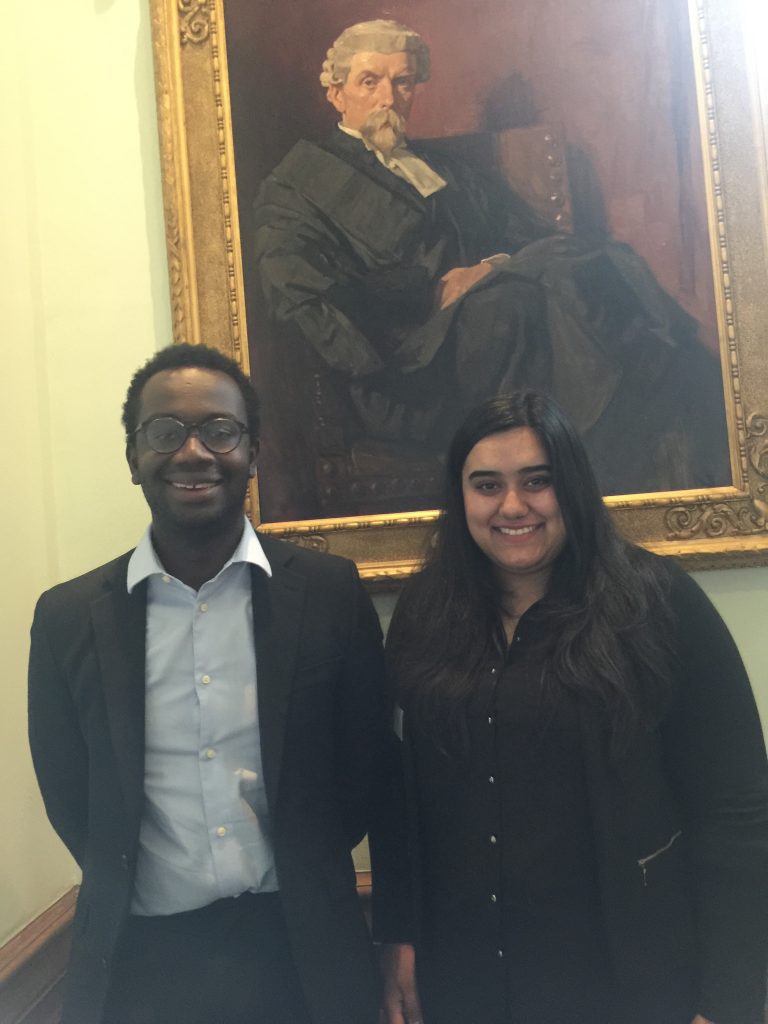The Michael Corkery QC Criminal Law Moot 2019
On Saturday 7th December, Zahra Ahmed and Kofi Otu (students on the GDL at City Law School and relative newcomers to mooting) competed in the inaugral Michael Corkery QC Criminal Law Moot, run by 5 Paper Buildings. Here’s the day through the eyes of Zahra…
*Friday 6th December 2019*
It’s the last day of Term 1 on the GDL. Tomorrow will be my second attempt at mooting, hosted by an actual chambers with actual barristers. I’m itching to make a good impression but I’m not sure I will be able to shake off the nerves from my first internal moot a month ago – the long awkward silence as I had frozen and paused just as I started my submissions. Only to freeze again… and again. After the nerve-racking experience of the City GDL Internal Moot (and almost bursting into tears after I had left the room), you can imagine I am on edge at the thought of mooting in a more formal environment. Plus with a team mate who I do not want to let down.

The Michael Corkery QC Criminal Moot is made up of 3 rounds with 22 universities taking part in the first round of the competition. The moot problem is largely based on the high profile real-life case of Charlie Alliston, who was riding a ‘fixie’ bike without proper braking mechanisms. Cycling through a busy central London during lunchtime, there was a fatal collision killing a pedestrian who had stepped out from behind a parked lorry.
Our team have to argue that the conviction for unlawful act manslaughter is unsafe – not an easy feat when we have only finished the topic of Involuntary Manslaughter on our course today!
I had learned from last time that ‘winging it’ when it comes to the moot speech is definitely NOT the way to go. I decide that the only way to conquer my nerves is to write out my whole speech and practise. So I do. I practise. I edit the speech. I practise again. I practise with my moot partner. I check that I can present my submissions within the 10 minutes. I ponder over the weaknesses in my argument and possible questions the judge may ask. Before I go to bed, I practise again.
Hmmm…I almost feel confident…
*Saturday 7th December 2019*
Today’s the day! I am determined to overcome my nerves so that I never have to feel anxious about mooting again. On the way to Middle Temple I bump into my moot partner, Kofi, and meet some lovely fellow mooters from Nottingham University which puts me at ease. Shortly after arriving it’s time to get started; I’m up third to speak, as Junior Appellant.
Maybe this isn’t so bad after all? Maybe, it’s almost…fun?
Before I know it, I’m well into my first submission and I haven’t frozen! No awkward silences! Hallelujah! I listen to myself as I speak and realise I am speaking with confidence, just as I had practised. I think to myself ‘This could be quite enjoyable!’. The judge seems to be following and isn’t frowning. He intervenes a few times. I am mostly prepared and stay calm whilst answering the questions as best I can. There is one question of which I’m unsure, about whether the issue of foresight is an issue of fact, an issue of law, or both. I say both and explain why but after a few minutes I realise what the judge means, so at a relevant point in my submissions, I briefly correct myself. I manage to finish my submissions in time. The experience is a stark contrast to my first moot, and I sit down with a big smile on my face with relief, knowing I have done well just to have improved myself, no matter what the result of the first round is.
We receive some general feedback from the judge about what was positive as well as some areas of improvement. This time also presented a good opportunity for me to seek clarification on a specific mooting issue from a practising professional. This was particularly useful for me personally, so I would say it’s definitely good to speak up and ask a question if there’s something you’re unsure of, because such opportunities to learn how to improve on mooting are rare.
The rest of the day involves a very useful workshop to do with making a bail application, led by one of the Heads of Chambers, Julian Christopher QC, and is particularly good practise for a type of task at a pupillage interview. After lunch some junior members of chambers give a pupillage talk providing an insight into the culture of 5PB and what’s expected during the application process. As we wind down and await the results, it’s great to socialise with law students from other universities and share our experiences of studying law and mooting.

I won’t keep you in suspense any longer – we got through to the next round! The effort of thorough research, well thought out submissions, and practising certainly paid off. Preparation is key. I realise that practising the delivery of my oral submissions gave me confidence, which in turn enabled me to perform at my best.
Overall I feel I have learned a lot in the process of preparing for the moot and on the day itself. I had a really enjoyable and positive experience so I would recommend to anyone who may have had a bad experience with mooting or public speaking, don’t be put off! You may surprise yourself.
I would also like to take this opportunity to thank 5 Paper Buildings for hosting such a valuable and enjoyable experience.
City are very proud to hear that Zahra and Kofi went through to the second round, along with 9 other teams. We’ll wait to hear how they get on at the end of January!
